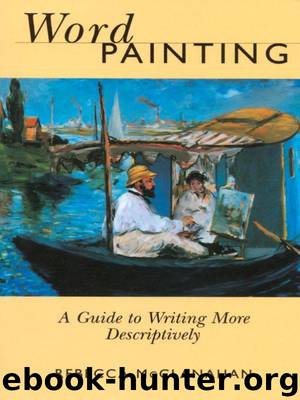Word Painting: A Guide to Writing More Descriptively by Mcclanahan Rebecca

Author:Mcclanahan, Rebecca [Mcclanahan, Rebecca]
Language: eng
Format: epub
Tags: ebook, book
Publisher: F+W Media, Inc.
Published: 1999-03-15T04:00:00+00:00
As the old saying goes, everybody has to be somewhere. Fictional characters are no exception. Once we give our character a name and body, we put a roof over his head or, at the very least, give him a place to roam. The world we create for the character includes not only physical spaces—a home, workplace, neighborhood—but historical settings as well. Since I’ll be discussing setting in another chapter of the book, I’ll confine my remarks at this point to those elements of setting that directly reveal a character’s character—not only his occupational and personal environment, but also his belongings, the objects that fill his world.
Often when I have trouble developing three-dimensional characters, it’s because I haven’t provided them with a suitable background against which to shine. For a long time, one of my characters refused to show herself. Her name was fitting, her actions believable and her internal conflict absorbing. But I could not visualize her; she did not feel real. She lacked a world in which to move. Once I found the right workplace for her (a greenhouse) and the right digs (a basement apartment on the premises) she fleshed out nicely. I could imagine her “wearing a dark green smock, watering ferns or pinching back wild vines, her face white and vulnerable against the leafy background of scheffleras and palms.” The greenhouse also provided a setting for her first meeting with the man who would become the father of her child. Since he happened to be a married man, the underground apartment mirrored their illicit relationship, deepening the internal conflict that drove the story to its conclusion.
A character’s immediate surroundings can provide the backdrop for the sensory and significant details that shape the description of the character himself. Environment can also mirror a character’s emotional state. If your character doesn’t yet have a job, a hobby, a place to live or to wander, you might need to supply these things. Once your character is situated comfortably, he may relax enough to reveal his secrets. On the other hand, you might purposely make your character uncomfortable—that is, put him in an environment where he definitely doesn’t fit, just to see how he’ll respond. Let’s say you’ve written several poems about your grandmother in the kitchen, yet she hasn’t begun to ripen into the three-dimensional character you know she could become. Try putting her at a gay bar on a Saturday night, or in a tattoo parlor—or at Appomattox, serving her famous buttermilk biscuits to Grant and Lee.
In describing a character’s surroundings, you don’t have to limit yourself to a character’s present life. Describe the house where he grew up or the room he shared with his twin brother. Childhood environments shape fictional characters as well as flesh-and-blood people. In Flaubert’s description of Emma Bovary’s adolescent years in the convent, he foreshadows the woman she will become, a woman who moves through life in a romantic malaise, dreaming of faraway lands and loves. We learn about Madame Bovary through concrete, sensory description of the place that formed her.
Download
This site does not store any files on its server. We only index and link to content provided by other sites. Please contact the content providers to delete copyright contents if any and email us, we'll remove relevant links or contents immediately.
Asking the Right Questions: A Guide to Critical Thinking by M. Neil Browne & Stuart M. Keeley(5757)
Autoboyography by Christina Lauren(5226)
Eat That Frog! by Brian Tracy(4525)
Dialogue by Robert McKee(4386)
Sticky Fingers by Joe Hagan(4188)
Journeys Out of the Body by Robert Monroe(3615)
Annapurna by Maurice Herzog(3464)
Full Circle by Michael Palin(3443)
Schaum's Quick Guide to Writing Great Short Stories by Margaret Lucke(3373)
Elements of Style 2017 by Richard De A'Morelli(3339)
The Art of Dramatic Writing: Its Basis in the Creative Interpretation of Human Motives by Egri Lajos(3058)
Atlas Obscura by Joshua Foer(2952)
Why I Write by George Orwell(2944)
The Diviners by Libba Bray(2927)
The Fight by Norman Mailer(2927)
In Patagonia by Bruce Chatwin(2920)
The Mental Game of Writing: How to Overcome Obstacles, Stay Creative and Productive, and Free Your Mind for Success by James Scott Bell(2897)
Venice by Jan Morris(2568)
The Elements of Style by William Strunk and E. B. White(2470)
